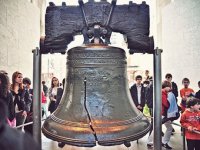Why Students Should Discover The Liberty Bell’s True History
As the new school year starts, there is value in asking all of our middle and high school students (at least) to think about something most will have heard of, but not thought about very deeply. Why? Because ultimately, education is about looking more deeply at the world around us, asking the critical questions, not simply accepting what is being presented, and creating new knowledge.
The Liberty Bell is a great vehicle for project-based learning that can create a common conversation in the school to give students these insights, and more.
In the Classroom
There are two assignments below that can be modified according to your time, goals, and other circumstances (such as Common Core objectives). I suggest treating this as an informal competition, with students being given latitude, or constraints, on how to present their results, depending on other educational priorities you might want to address. For example, student teams might create posters for a Liberty Bell Exposition in the school auditorium one evening, inviting parents and the community.
There might be debates set up during lunch periods, where teams present their positions and are challenged by other teams, who then present their own positions, and so on. Or small groups of students may work on this in a class on language arts, history/social studies, civics, character, or research skills, and present to one another. Ultimately, some consensus on the "true" story should be reached -- even if it is that there is not a single, "true" story. This consensus can be presented in written, video, art-related, musical, or other formats.
Post-Activity Reflection is Essential
Regardless of the approach and the specifics of the assignment, be sure to ask each participant to reflect on the experience of working in the team, what they learned personally about their own style of being in a team, what was frustrating, what was enlightening, how decisions were made (such as what and how many sources to consult, what format would be used for presenting), and any other reflections they would like to share. In this way, the activity is reinforcing social-emotional and character development and its integration with academic content.
Assignment #1: The Liberty Bell
Directions: Create a history of the Liberty Bell, using at least 3 different sources. Be sure to address these questions in your response:
- How many Liberty Bells have there been?
- What is the quotation on the Liberty Bell and where did it come from? Who chose it and why? What other translations are there of that quote? What part of the quote was omitted? What would be changed by adding it?
- How did the Liberty Bell get its name?
- What note was the Liberty Bell intended to sound?
- What is the modern history of the Liberty Bell -- who has used it as a symbol, either physically or in writing or speeches? Why did they choose this as a symbol?
- What are the lessons we can learn today from the history of the Liberty Bell?
Responses to the final question can cover the need to be careful in one's work, the importance of having ideals/purposes and attempting to live up to them, the value and meaning of symbols, the importance of collaboration, courage and leadership, the meaning of freedom and liberty in revolutions then and now, the challenges in finding the "truth" of what happened in a situation, the benefits of understanding the context of a quote.
Assignment #2: A Biographical Investigation
Directions: Who was Jacob Duché and what was his role in the American Revolution? (Be sure to use at least 3 different sources) Be sure to address these questions in your response:
- What did Duché do that would have led people to refer to him as a person of inspiration? As a person of courage? As a traitor? What is your opinion of him?
- What was Duché's relationship with George Washington?
- What title did Duché have after the Declaration of Independence? What title did Duché have in England?
Please have your students share some of their responses in the comment section below, or share links to your students' work at your school websites.
